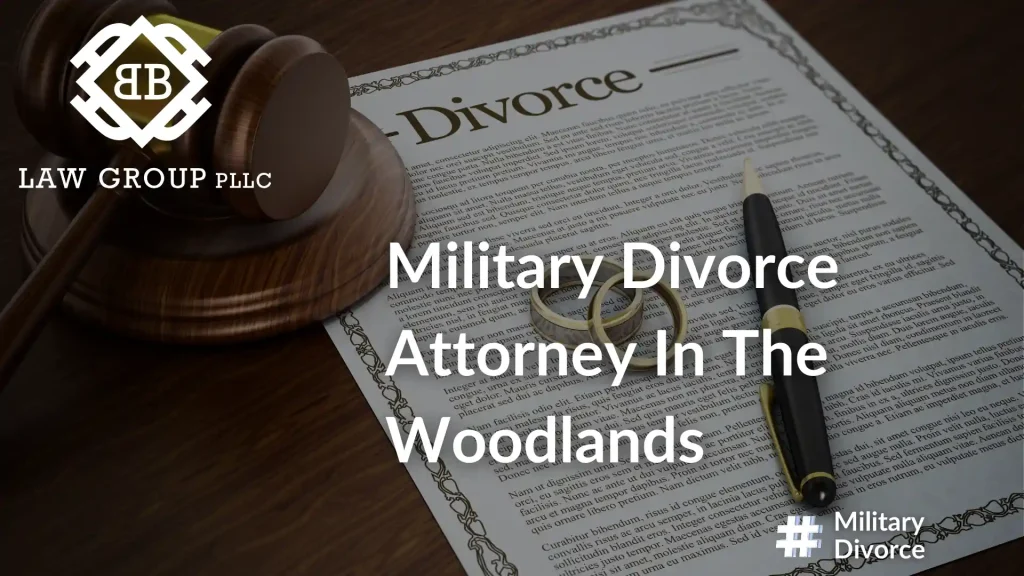
While only 3% of military members get divorced, and military divorces make up a small number of nationwide divorces overall, it’s important that members of the U.S. military know that seeking a divorce is an option when they are unhappy in their marriage. However, military divorces are different from divorces sought by other citizens, as those in military marriages generally have unique factors that must be considered.
An experienced divorce attorney from The Woodlands BB Law Group PLLC can help you navigate through every step of your divorce proceedings during this difficult time. Contact us today at (832) 534-2589 to schedule a confidential consultation to review your options.
Why Do I Need a Military Divorce Attorney?
Military divorces raise many complicated questions. How does a divorce work if one spouse is on active duty? How do the parties fairly divide shared property and assets, such as military retirement accounts? How is child custody organized if one spouse is on duty out of state or abroad? An experienced military divorce attorney will answer these questions and help you work through the unique challenges presented by a military divorce.
Divorce is often a highly stressful and emotional process. The added complications of navigating complex military rules and regulations can make military divorces feel overwhelming. An attorney will help arbitrate without the emotional investment that can make it difficult for spouses to reach agreements. An attorney will also ensure that all documents are properly completed and submitted on time, as making mistakes in this process can result in costly fees and delays.
Hiring a divorce and family law attorney who only handles civilian divorces may reduce your chances of a fair divorce settlement. It’s critical that an attorney has expert knowledge of the federal laws governing military divorce and asset division. It’s in your best interest to hire an attorney who deals specifically with military divorces.
Why Should I Choose BB Law Group PLLC?

If you or your spouse is a member of the military and you are considering a divorce, please contact BB Law Group PLLC today at (832) 534-2589 for a confidential consultation. Get directions to our law firm and read client reviews on Google.
What Makes Military Divorce Different
Members of the U.S. military and their spouses operate under certain different divorce laws and regulations than regular citizens. Several of the aspects of military divorce that make this process different include:
- Exemption from “default” charges when a service member is on active duty (if they fail to respond to divorce action). Normally, if someone is served with legal papers requiring them to take a certain action like appear in court, failing to do so can have serious consequences. The petitioner (the person filing for divorce) can ask for a default judgment that essentially gives the petitioner what they originally requested. The Servicemembers Civil Relief Act (SCRA) helps protect the legal rights of those on active duty. The SCRA recognizes that active service members may be in extenuating circumstances that prevent them from responding to a petition within a certain time frame. Under the SCRA, active service members are entitled to:
- A postponement of divorce proceedings if the service member is unable to attend because of active duty
- Certain protections against default judgments against those who fail to respond to legal papers or appear at trial
- Service of divorce notification directly to an active duty service member. Texas law requires that active-duty members are served with divorce papers in person. This can become complicated if the service member is out of state or abroad. It’s possible to file a waiver of this requirement, but only if the divorce is uncontested.
- In Texas, residency requirements that state that either you or your spouse must be living in / stationed in Texas at the time of the divorce. In order to file for divorce in Texas, one party must have been a Texas resident for at least six months and must have lived in the county in which they file for at least 90 days. This requirement sometimes presents problems in military divorces because military couples often move frequently. You may have to wait to file for divorce or file in a different state. If you are unsure whether or not you meet residency requirements for filing for divorce, contact a Texas military divorce attorney.
- Proper division of property, under the Uniformed Services Former Spouses’ Protection Act (USFSPA). Dividing financial assets is one of the most complicated parts of a military divorce. In general, spouses are usually entitled to half of the service member’s military disposable retired pay. In contrast, USFSPA does not entitle former spouses to any portion of the service member’s VA disability compensation, military disability retired pay, Special Combat-Related Compensation, and Concurrent Retirement and Disability Pay.
These stipulations can make divorce in the military extremely different than it is for regular citizens. As such, having an in-depth understanding of these regulations and laws that pertain to your situation as a military member is critical.
Frequently Asked Questions
These are some of the questions we often receive regarding military divorces. If you have any additional questions, please do not hesitate to contact us at (832) 534-2589 for a confidential consultation.
My former service member spouse chose to receive retired military disability pay. Does this affect my entitlement to half of their disposable retired pay?
It might. When service members elect to receive disability compensation, they usually must agree to a dollar-for-dollar waiver of their retired pay. Effectively, they can’t receive full disposable retired pay if they are also receiving disability pay. This can drastically reduce how much money you receive in your share of retired disposable pay. A lawyer can help ensure that the divorce agreement includes provisions that protect your share of retired disposable military pay.
How are custody and child support arrangements handled in a military divorce?
Custody, visitation, and child support are arranged in the “best interest of the child,” which is the same standard as in civilian divorces. However, custody and visitation arrangements are often complicated in military divorces by the fact that the service members may be sent off for duty at any time. The service member may move to or already live in another state or country. Military divorce custody agreements should account for these unique circumstances. Examples of provisions in military custody and visitation arrangements are:
- Arranging times and dates for phone calls between children and service member
- Allowing the service member extra time with the children while they are home on breaks
- Giving certain custodial rights to the parents of the service member while the service member is on active duty
My spouse and I agree on the terms of our divorce. Do we still need to hire lawyers?
It is not legally required to hire a lawyer in a divorce case. However, because military divorces are exceptionally complicated, it’s in your best interest to hire a lawyer even if your divorce is uncontested. Even if your divorce is very amicable, it’s important to consider how profoundly a bad divorce settlement can affect your life. Many individuals who choose not to hire lawyers during their divorce end up signing agreements without fully understanding the legal implications, and sign away rights to child custody and property.
Contact Us
Because divorce for military and service members’ spouses involves some unique laws, it’s important to have an experienced attorney at your side who can walk you through this process and how you will be affected. Final military divorce agreements are extremely hard to change, and a bad divorce agreement can have lifelong implications for you, your finances, and your children. Hiring a skilled military divorce attorney is crucial in ensuring that your rights are protected.
If you or your spouse is in the U.S. military and you are thinking of ending your marriage, speak with a military divorce lawyer of the BB Law Group PLLC, today. Call (832) 534-2589 today to discuss your particular situation.